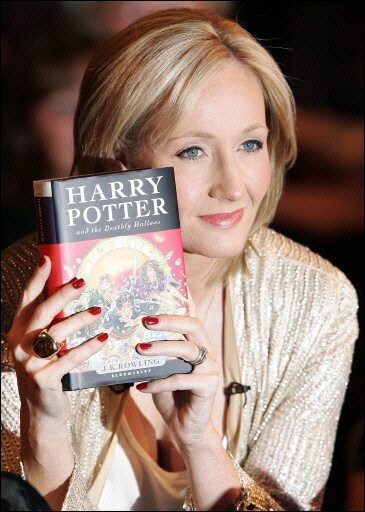The King of his Field
 Get any avid reader to talk about the horror books they read and you’ll more than likely find the name Stephen King crops up in association. That’s because King is one of the most creative, productive and therefore successful writers in the world today.
Get any avid reader to talk about the horror books they read and you’ll more than likely find the name Stephen King crops up in association. That’s because King is one of the most creative, productive and therefore successful writers in the world today.
In his lifetime, King has sold more than 350 million copies of books globally, many of which have been adapted into films such as ‘The Shawshank Redemption’ and ‘The Green Mile’ to name two of my favourites. Even from the start with Carrie there was no denying that the quality of his written work was un-replicatable and genius. He took the world by the shoulders and shook it for readers and writers everywhere.
A Biography: The History that Made this Man Who he is Today
Stephen King was born in 1947 in Maine, USA; a place where he still lives today and sets many of his novels. His parents separated when he was just a toddler, thus he was raised by his mother on her own along with his brother David.
From a young age, Steven loved stories. His mother was his first reader, and after reading a version of Combat Casey in first grade she convinced Stephen to try writing a story for himself.
Steven took the advice and sold the story to his mother and her friends for a quarter each whilst recovering from an illness that put him back a year in school. “She said it was good enough to be in a book. Nothing anyone has said to me since has made me feel any happier.”
Stephen went through school publishing short stories in Dave’s Rag, his brother’s school magazine and selling stories independently to his peers. When the teacher discovered that Stephen was selling his work on school premises, they did not celebrate the initiative but ban it. Stephen was forced to return the earnings made.
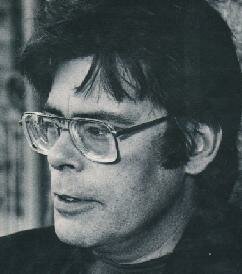 Whilst in the process of graduating from the University of Maine with a B.A in English, Stephen met his future wife Tabitha Spruce at a library within his school where they both worked. King says he fell in love with her in a poetry workshop in 1969. They married in 1971 and are still married in present day. “Writing is a lonely job. Having someone who believes in you makes a lot of difference.” Says Steven.
Whilst in the process of graduating from the University of Maine with a B.A in English, Stephen met his future wife Tabitha Spruce at a library within his school where they both worked. King says he fell in love with her in a poetry workshop in 1969. They married in 1971 and are still married in present day. “Writing is a lonely job. Having someone who believes in you makes a lot of difference.” Says Steven.
For a while the growing family were poor. Stephen was unable to find a teaching job until 1971 and instead worked in an industrial laundry, selling short stories to magazines. He gained quite a selection of rejection slips during this time, hanging them from a spike on his bedroom wall.
In 1973 King’s mother died but the following year, his first novel ‘Carrie’ was published with enough sales to allow him to quit teaching and write full-time. The novel, once had to be pulled out the trash bin by his wife in the early days, after King had been certain that that’s where it belonged. She told him otherwise. And once published, it was a best seller. And the first step towards Kings success.
From then on King wrote best seller after best seller. Each adding to his snowballing writer’s credibility. But the death of his mother had hit him hard and through-out his writing career King struggled with addictions to drugs and alcohol. In fact he doesn’t even remember writing ‘Cujo’, which is considered one of his better novels.
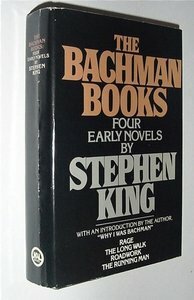
Between the years 1977 and 1985 Stephen King wrote five books under the name of Bachman; one of which, Rage, is banned from print in the USA. The aim behind these books was to test if he could replicate his success again and to see if his popularity was genuine. These books were also whipped off the shelves proving that it was.
In the end he was uncovered by a bookstore Clerk who noticed similarities in the writing styles of Bachman and King and located publisher’s recorders which included a document naming Stephen as the author of a Bachman novel.
He admitted full responsibility in an essay published in the book to follow named ‘Thinner’. The following is a quote to the book from King, “My ‘Stephen King publishers’ were like a frigid wifey who only wants to put out once or twice a year, encouraging her endlessly horny hubby to find a call girl. Bachman was where I went when I had to have relief.”
It just goes to show that nothing can stop creators from creating, if they believe in what they do.
Not surprisingly King has won many awards in his career, including best novel from the Horror Writers Association and the Locus awards. Some of his most famous novels include ‘Carrie’, about a teenage girl with ability to telecommunicate, ‘IT’ about a murderous clown and ‘Misery’ about a writer who is saved from a car crash by his number one fan.
Stephen King himself experienced a near-death car accident in 1999 where he was hit by a van, out on a walk around his summer house in western Maine. King was lucky to survive.
After five operations and physical therapy, he returned to carry on working on his non-fiction novel the following month, after he was left with many broken bones, bound to a wheelchair and in a condition where sitting up at a desk was physically and mentally excruciating. ‘I didn’t want to go back to work,” he said, “I was in a lot of pain.’
Yet we know from his most recent novels that he did go back to work. With the help and support from his wife and the determination that came from his belief in what he did. Stephen King has since published thirty six novels, novellas and essays. He continues to write and perform seminars to this day.
Lessons to be Learnt from his Life & Struggles
You Can Get Back Up From Anything.
After Stephen was left close to fatality after his car accident in 1999, he had lost all hope. “How was I supposed to write about dialogue, character and getting an agent when the most pressing thing in my world was how long until the next dose of Percocet?’ The world dipped their heads, at the loss of their favourite craftsman.”
But Stephen didn’t give up.
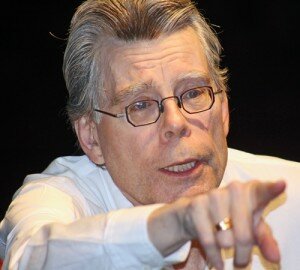 Every day we moan about something. We give excuses as to why we didn’t do this, why we didn’t do that. Why we’re not the best yet. Why we’ll do that tomorrow. But quite often these excuses are empty. Even Stephen’s was. But to sacrifice his greater cause would have been to sacrifice as a person. Because although the man rightly preaches that “art is a support for life, not the other way around” there is no denying that sometimes it’s our art, our talents, our beliefs in the future that keep us going and keep our mind off any pain we feel.
Every day we moan about something. We give excuses as to why we didn’t do this, why we didn’t do that. Why we’re not the best yet. Why we’ll do that tomorrow. But quite often these excuses are empty. Even Stephen’s was. But to sacrifice his greater cause would have been to sacrifice as a person. Because although the man rightly preaches that “art is a support for life, not the other way around” there is no denying that sometimes it’s our art, our talents, our beliefs in the future that keep us going and keep our mind off any pain we feel.
The writer in me. The business man in Joe. The talent within you is part you. Our talents aren’t all of us, but they are a big part of us. To channel any gift is to make use of the gift. To neglect a gift is a crime. And thus, the pain of perseverance is always, always, always worth it.
1) Throw Yourself In – Things will get better:
“The first five hundred words were uniquely terrifying – it was as if I’d never written anything before them in my life.”
Stephen sat down one day and he wrote. And it was hard. Agony in fact. His words had dried out, and his bones were sore. He wanted to give up. But he didn’t. Stubborn determination got him through one uninspired, unproductive evening. But even the smallest of steps count and once he’d started, the words flowed more and more easily.
We can learn from this. If you get off track or have an idea you’ve never had the courage to put into reality… just go for it. Because things have a habit of falling into place when you make the first move as long as your hearts in it and your willing to work to make it work. As a creative person, I know there are days when you may sit at your desk and wish you were somewhere else. But if you take the first step and persevere, you will achieve.
Quite often the hardest part is starting.
2) Art is a Support for Life – Not the other way around:
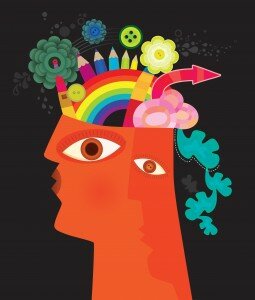 Stephen used his writing to take his mind off the pain of reconstruction. But it wasn’t everything. Being a human is not just about having a talent, or the determination to put forward this talent and the dreams you have into a reality. But it’s about having support around you too, so that you can share your greatest moments, your worst problems and get a fresh perspective on your work.
Stephen used his writing to take his mind off the pain of reconstruction. But it wasn’t everything. Being a human is not just about having a talent, or the determination to put forward this talent and the dreams you have into a reality. But it’s about having support around you too, so that you can share your greatest moments, your worst problems and get a fresh perspective on your work.
In Stephen’s case the sharer was his wife.
“When I told her on that July morning that I thought I’d better go back to work, I expected a lecture. Instead she asked me where I wanted to set up.”
She spent hours helping him make a desk that suited his needs and allowed him to do what he must do, proving that it’s important to have a life outside your art; particularly in human moments when the world is painful or uninspiring. After all without Kings wife there would be no Carrie (the start to it all) and probably no ‘thirty six novels, novellas and essays’ to follow the accident.
Creativity is often a solitary field. But it’s important to understand that you write for the people and that you are human too. There will be times when it’s hard to carry on, just make sure you have someone there to help you get back on track and remind you why you’re sat at your desk at this time of night.
To Conclude: Talent, is nothing without work and perseverance
“Read and write four to six hours a day. If you cannot find the time for that, you can’t expect to become a good writer.”
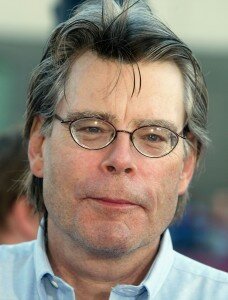 When Stephen got back to work, his expectations of himself were the same as before. He kept his door shut whilst he worked, kept his focus within, and shared with those around him the troubles he faced.
When Stephen got back to work, his expectations of himself were the same as before. He kept his door shut whilst he worked, kept his focus within, and shared with those around him the troubles he faced.
Pain was not an excuse for Stephen. Time, money, and energy is not an excuse for you, you don’t get prestige just through being talented. You have to earn your respect and gain your success by getting things done and providing ‘honestly’ to the people. Giving them what they want, through channelling what you’re passionate about.
The truth is that if you want to write a book you have to write.
Anything creative that you dream of feeding to the world has to have the mindset, the push and support behind it to make it into a reality. You have to believe in what you do and let nothing stop you from working. Make no excuses and just persevere, even when your inspirations and motivation is knocked down.
Further Reading: Stephen King On Writing (Book)
Wrote by Aimee Hall


